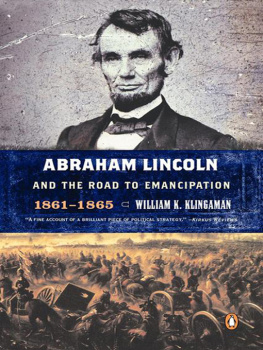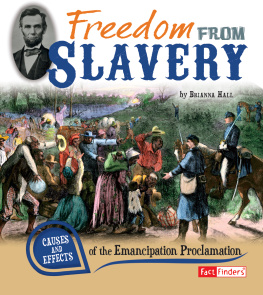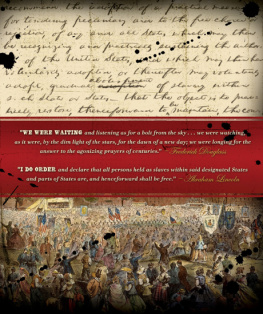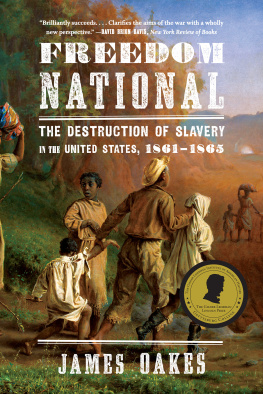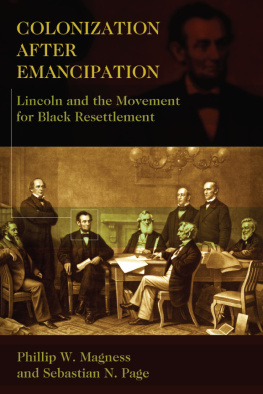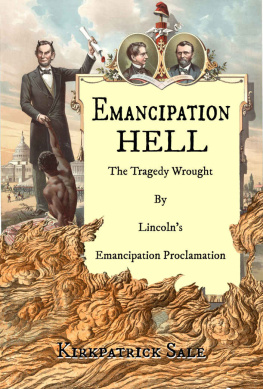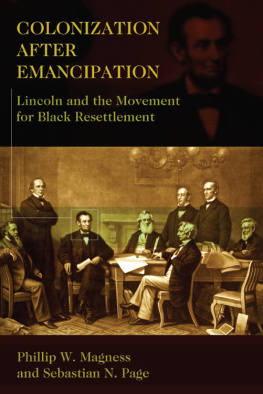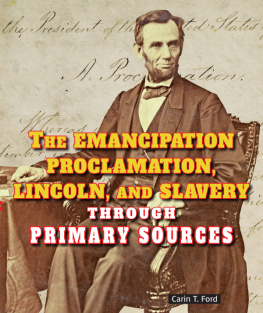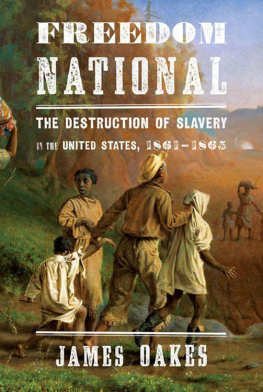VIKING
Published by the Penguin Group, Penguin Putnam Inc., 375 Hudson Street, New York, New York 10014, U.S.A. Penguin Books Ltd, 27 Wrights Lane, London W8 5TZ, England
Penguin Books Australia Ltd, Ringwood, Victoria, Australia
Penguin Books Canada Ltd, 10 Alcorn Avenue, Toronto, Ontario, Canada M4V 3B2
Penguin Books (N.Z.) Ltd, 182-190 Wairau Road, Auckland 10, New Zealand
Penguin Books Ltd, Registered Offices:
Harmondsworth, Middlesex, England
First published in 2001 by Viking Penguin,
a member of Penguin Putnam Inc.
Copyright William K. Klingarnan, 2001
All rights reserved.
Klingarnan, William K..
Abraham Lincoln and the road to emancipation, 1861-1865 / William K. Klingarnan.
p. cm.
ISBN 978-1-1012-1870-9
Without limiting the rights under copyright reserved above, no part of this publication may be reproduced, stored in or introduced into a retrieval system, or transmitted, in any form, or by any means (electronic, mechanical, photocopying, recording, or otherwise), without the prior written permission of both the copyright owner and the above publisher of this book. Making or distributing electronic copies of this book constitutes copyright infringement and could subject the infringer to criminal and civil liability.
First edition (electronic): March 2003
For Joan and Jim McCrumb
W hen the Civil War began in April 1861, President Abraham Lincoln had no intention of issuing an emancipation proclamation. Lincoln believed he lacked the constitutional authority to interfere with slavery in any state, even when the government of that state insisted it was no longer a part of the Union. The president feared that emancipation would shatter the northern consensus in favor of a war to preserve the nation, and might alienate the border slave states that remained in the Unionpossibly leading them to secede and join the Confederacy.
Lincoln also shrank from emancipation because he did not know if four million free African-Americans could find a place in American society. Slaveryand the racism that sustained ithad deep roots in the nations psyche. Viewing the effects of more than two centuries of slavery, white Americans doubted whether blacks could sustain themselves in a competitive economy, or fulfill the responsibilities of citizenship in a democracy. Lincoln understood that every part of the nation shared this prejudice; his only solution was to colonize free blacks outside the United States.
This book recounts Lincolns gradual conversion to the cause of emancipation. I have written it as a narrative to re-create the pressures and events that led Lincoln to adopt the role of emancipator, a role he accepted with great reluctance. In a recent biography, David Donald has emphasized Lincolns essentially passive nature, his willingness to allow circumstances to narrow his options or even determine his policy. Nowhere was this tendency more evident than in dealing with slavery.
Lincolns decision in the summer of 1862 to issue an emancipation proclamation represented one of the boldest gambles of his presidency, but it was a gamble born of desperation and frustration from repeated military failures. Things had gone on from bad to worse, Lincoln later recalled, until I felt that we had reached the end of our rope on the plan of operations we had been pursuing; that we had about played our last card, and must change our tactics, or lose the game. The Emancipation Proclamation was a weapon to help the Union win the war. When Lincoln finally issued the proclamation on January 1, 1863, he hedged his bet by couching emancipation in conservative, legalistic language. There were no inspiring words about racial justice, no commitment by the government to help the freed slaves obtain equality.
What began as a study of the Emancipation Proclamation soon led me into a broader examination of racial attitudes in the United States. Throughout the narrative, I have attempted to convey the pervasive nature of certain assumptions held by most white Americans about blacks in the mid-nineteenth century. Many whites believed that the behavior of slaves reflected the inherent nature of blacks, rather than the deadening effects of chattel slavery. Even those whites who were willing to grant blacks a measure of humanity felt that it would take several generations to eradicate the deleterious consequences of slavery and bring blacks close to the level of whites. To help re-create this mind-set, I have used the most common contemporary term of Negroes to refer to African-Americans. For the same reason, I have retained the word nigger wherever it appeared in quotesas jarring as it may beas well as the black dialect quoted by whites in contemporary sources. Interestingly, most writers transformed Lincolns western speech into grammatically correct English; they did not afford the same privilege to African-Americans.
Like anyone who writes about the Civil War era, I owe a great deal to a multitude of historians who have studied the period from nearly every angle. The continued publication of diaries, memoirs, letters, and other contemporary sources provides writers with an abundant harvest that kept me eager to add newly discovered material throughout the publication process. My deepest thanks go to my agent, Donald Cutler, who first encouraged my interest in this topic and guided me with an expert hand through several early drafts. My editors, Sarah Baker and Michael Mill-man, have smoothed the publication process and improved the manuscript substantially with their insightful observations. M. H. Lankin and Joan McCrumb also provided support and excellent suggestions. Any flaws that remain are entirely my responsibility. Finally, I would like to thank my wife, Janet, and my children, Nicholas and Marianne, for their patience and love while I completed this study.
1

INAUGURATION DAY: MARCH 4, 1861
S hortly after dawn, Abraham Lincoln awoke in his second-floor suite at Willards Hotel, two blocks from the White House. Outside, the city was stirring earlier than usual. Through his window above Pennsylvania Avenue, Lincoln could hear delivery wagons driven by Negro laborers rattling over the rutted, unpaved streets, bringing fresh oysters, shad, and eggs to the hotels kitchens for breakfast. Young boys were already circulating through the gathering crowds, hawking American flags, sheets with the lyrics of patriotic songs, and newspapers featuring lithograph portraits of the incoming president. On the street corners, the long cast-iron handles of wooden water pumps creaked as visitors unable to find hotel rooms washed their faces after spending a chilly evening in the citys parks. From a distance came the less familiar sound of troops marching through the streets to take up their stations along the inaugural parade route.
Lincoln was not yet aware of what was happening on Capitol Hill, at the other end of Pennsylvania Avenue. Thirty-six weary senators were wrapping up an all-night session with a vote on a final compromise to save the Union by allowing slavery into the New Mexico territory. With every senator of Lincolns Republican Party voting against it, the measure failed by a narrow margin. Visitors leaving the galleries wondered aloud if the nation would survive until April.
There were men in Washington who hoped this would be the last day of Lincolns life, and Lincoln knew it. Threats had been made against him even before he arrived in the capital nine days earlier. After several reliable sources reported evidence of a conspiracy to assassinate Lincoln as his train passed through Baltimore, the president-elect had altered his original itinerary and entered Washington secretly, ahead of schedule, disguised in an overcoat, muffler, and plaid capalmost, noted one observer, like a fugitive slave, seeking concealment... arriving not during the sunlight, but crawling and dodging under the sable wing of night.

